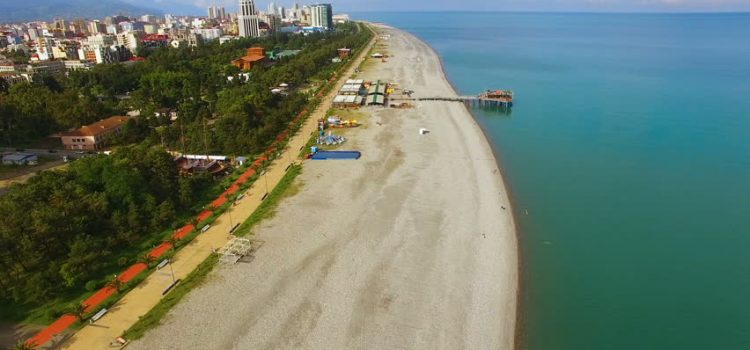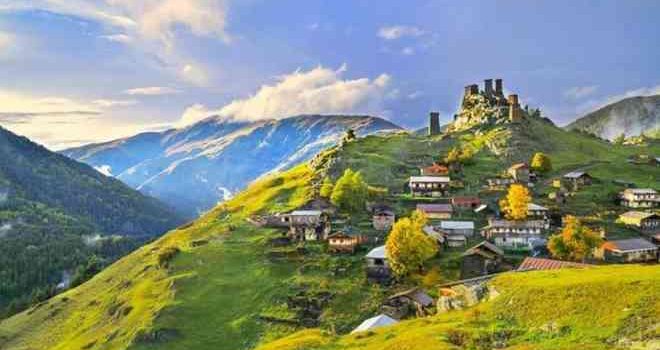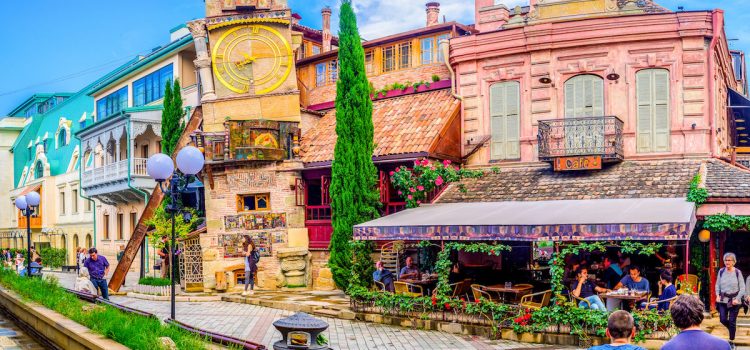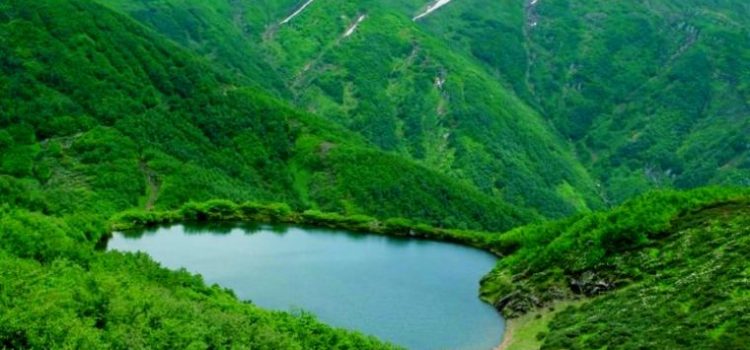Georgia on their minds: why tourists are flocking to the Black Sea
The city of Batumi on Georgia’s Black Sea coast is bracing for a tourism boom after winning the 2019 title of “Europe’s Leading Emerging Tourism Destination” at the prestigious World Travel Awards.
In recent years, the region has attracted significant investment. And the results are clearly visible.
The summer season has just begun but already tourist figures are breaking records. Dozens of new hotels have appeared along the coast and the number of international visitors in Batumi has almost doubled since the beginning of this year.
It’s also gaining a reputation as a centre of youth culture.
Joseph, a young street-artist, believes his city has much more to offer.
He’s confident that soon Batumi will be a focal point for creative youth and compete on an equal footing with the capital, Tbilisi.
“You can see how the city has changed on a cultural level – cinema, theatre, music, poetry, architecture, art etc,” he told Focus. “Batumi is in a constant state of development and we are able to create new trends in the cultural life of the city.”
In Georgia new cultural trends are closely intertwined with the country’s rich traditions and history.
It’s no surprise that Georgian polyphonic singing was recognised as Intangible Cultural Heritage by UNESCO.
Add to this the region’s beautiful and diverse landscapes and you get a fuller picture of Adjara and its tourism potential.
You can head straight from the beach to the mountains and picturesque valleys. It’s all possible in Adjara, thanks to its unique ecosystem.
Tornike Rijvadze, Chairman of the Government of Adjara, told Focus: “Ecotourism is actually one of the greatest opportunities we’ve got here. Our agencies work very hard to find new directions. We expect to have quite a successful season this year.”
The region is also famous for its wine. According to archaeologists, winemaking in Georgia can be traced back thousands of years.
Local winemaker Rostom Beridze, said there are almost 500 types of grape varieties in Georgia and about 50 of them grow in Adjara.
“Such diversity gives us an advantage in creating wines that are very different from what you can find elsewhere,” he said.
Beridze added: “It’s impossible to talk about wine and not be in a positive mood. We are very proud of our winemaking heritage.”
Source: www.Euronews.com
The Daily Beast about Tusheti: The Last Wild Place in Europe
The Daily Beast has recently published an article about Tusheti, a historic region in northeast Georgia. Benjamin Kemper, the author of the article claims that the venue is the last wild place in Europe. He had visited Georgia many times but Tusheti had always been out of reach. The road to Tusheti is one of the most dangerous drives in the world.
“Even at the height of summer, it takes six hours of nauseous off-roading from the nearest town to reach the first Tushetian hamlets, and once you’ve arrived, you can all but forget creature comforts like cell service, internet, ATMs, and heat. But I was sold: The promise of an off-the-grid adventure in one of the last truly wild corners of Europe was too enticing to pass up,” reads the article about Tusheti.
The intact nature of Tusheti awaits visitors. The area is inhabited by “mountain goats, imperial eagles, brown bears, and, if you’re lucky, rare indigenous species like the Caucasian black grouse and East Caucasian tur, a goat-antelope with horns so enormous they look like they belong on a triceratops. There are even occasional, if uncorroborated, Persian leopard sightings.”
A herd of animals is moving forward on rocky slopes of the Great Caucasus Mountain and the scene can be observed from almost any place in Tusheti. The centuries-old towers will amaze visitors by their greatness and long-standing history. The towers used to be refuges protecting the locals from invaders or fatal avalanches.
“Medieval Tushetians did not mess around—they had their freedom to protect. From the earliest written records until well into to the 17th century, they enjoyed virtual autonomy as a tribal democracy. Although Tushetians coexisted fairly peacefully through the centuries with neighboring tribes such as the Chechens, Khevsurs, Lesghians, and Hinukhs, and traded often with them, they remained culturally distinct with their animist deities, transhumant lifestyle, fast-footed dances, and twangy dialect,” reads the article about the history of Tusheti.
Upon the hills, one can find a cluster of shrines called khatebi that is allegedly dedicated to Pagan-Christian demigods. Meanwhile, visiting a family in Tusheti will definitely involve tasting the traditional lamb-stuffed khinkali (Georgian dumpling).
Interested in the future of the region, Nugzar Idoidze, one of the locals of the village Omalo in Tusheti cheers the author up by saying that since Tushetians survived the Soviet pressure, they can survive anything.
The Daily Beast is an American news and opinion website focused on politics and pop culture.
source: www.Georgianjournal.ge
Campaign ‘Spend Your Summer in Georgia’
Russian President Vladimir Putin has signed a decree prohibiting Russian airlines from carrying Russian citizens to Georgia from July 8. Putin has ordered the Cabinet of Ministers to help the citizens of Russia, who are traveling to Georgia, to return to Russia. Moreover, some recommendations have been issued for Russian tour operators, calling on them to refrain from selling tours in Georgia.
Subsequently, Russian airlines will stop selling air tickets to Georgia from July 8. According to Russian media, Smart, Pabeda, Red Drive and S 7 have already stopped selling tickets.
In response to the ban and the possible threats to the Georgian tourism industry, Georgian activists together with businessmen and international society have launched the campaign ‘Spend Your Summer in Georgia’. The campaign aims at popularizing Georgia as a travel destination to tackle the possible difficulties due to the decreased number of incoming Russian tourists. Besides, Russian tourists have encouraged their Georgian friends by saying that they will find other ways to reach Georgia.
Georgian airline companies are also launching Russia-Armenia-Georgia flights to help Russian tourists enter Georgia. Georgian businessman Mamuka Khazaradze is ready to cover 10 flights for Ukrainian tourists to support the Georgian tourism industry. Every day local as well as international support is getting stronger and stronger.
The ban was followed by the cancellation of the Inter-Parliamentary Assembly on Orthodoxy. The assembly was led by the President of the Inter-Parliamentary Assembly on Orthodoxy, Sergei Gavrilov, a deputy of the Russian Duma from the Communist Party. Angered by the presence of Sergei Gavrilov in Georgia, citizens gathered at the Parliament building in Tbilisi to protest Russian occupation in Georgia.
Source: www.Georgianjournal.ge
Mtirala: Georgian nature at its purest
It is pure, unblemished nature…
Yet the Mtirala National Park can be found just 40 kilometres from Batumi, the capital city of Georgia’s autonomous republic of Adjara.
“We’re lucky to have the sunshine: this Adjarian national park, Mtirala, is considered Georgia’s rainiest spot of land,” said Euronews reporter Denis Loctier, as he explored the region.
In this high humidity, the air is fresh and fragrant with blooming flowers and herbs.
It’s a protected site for the region’s flora and fauna, including rare and endangered endemic species.
“Mtirala translates as ‘a weeping mountain’. This place is often clouded in mist and drizzle. That’s where the name comes from,” explained park guide, Zia Kontselidze.
At 1,500 metres above sea level, Mtirala’s trails are perfect for hiking, bird watching and adventure tours.
Source: Euronews.com




